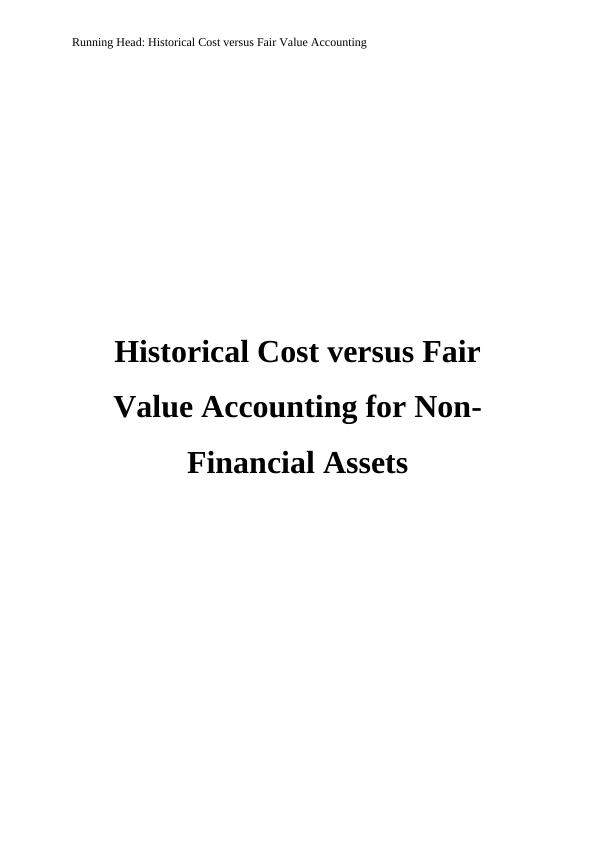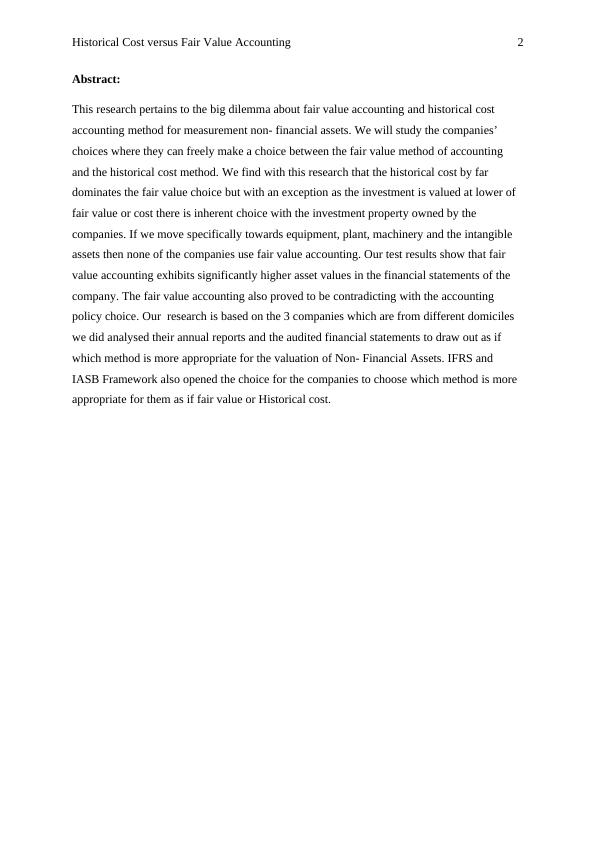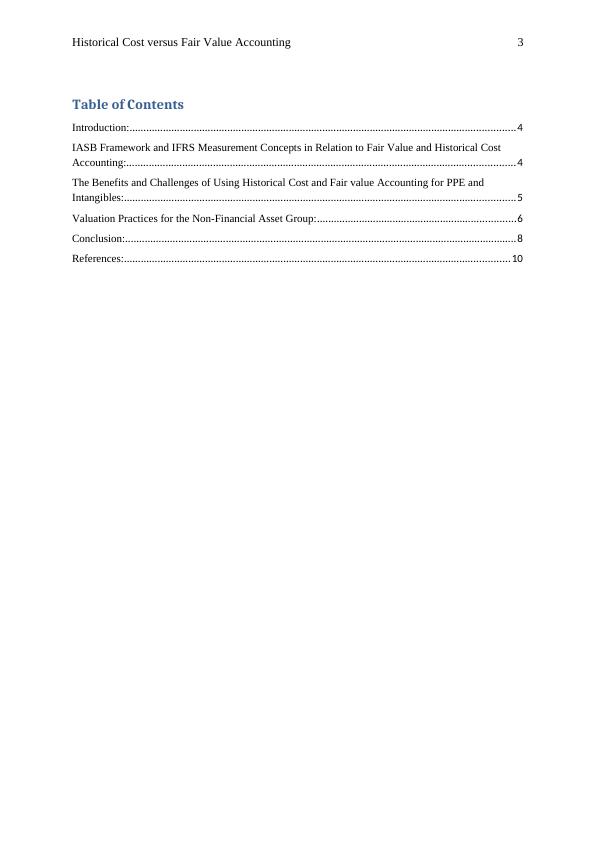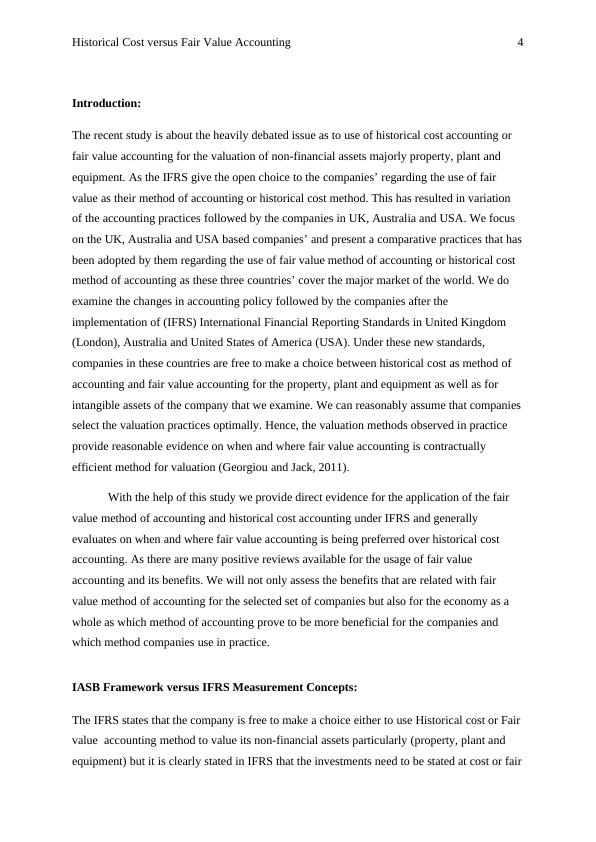BAO3309 Accounting Assignment | Historical Cost versus Fair Value Accounting
Added on 2020-05-28
12 Pages3881 Words95 Views
Running Head: Historical Cost versus Fair Value AccountingHistorical Cost versus FairValue Accounting for Non-Financial Assets

Historical Cost versus Fair Value Accounting2Abstract:This research pertains to the big dilemma about fair value accounting and historical cost accounting method for measurement non- financial assets. We will study the companies’ choices where they can freely make a choice between the fair value method of accounting and the historical cost method. We find with this research that the historical cost by far dominates the fair value choice but with an exception as the investment is valued at lower of fair value or cost there is inherent choice with the investment property owned by the companies. If we move specifically towards equipment, plant, machinery and the intangible assets then none of the companies use fair value accounting. Our test results show that fair value accounting exhibits significantly higher asset values in the financial statements of the company. The fair value accounting also proved to be contradicting with the accounting policy choice. Our research is based on the 3 companies which are from different domiciles we did analysed their annual reports and the audited financial statements to draw out as if which method is more appropriate for the valuation of Non- Financial Assets. IFRS and IASB Framework also opened the choice for the companies to choose which method is more appropriate for them as if fair value or Historical cost.

Historical Cost versus Fair Value Accounting3Table of ContentsIntroduction:..........................................................................................................................................4IASB Framework and IFRS Measurement Concepts in Relation to Fair Value and Historical Cost Accounting:...........................................................................................................................................4The Benefits and Challenges of Using Historical Cost and Fair value Accounting for PPE and Intangibles:............................................................................................................................................5Valuation Practices for the Non-Financial Asset Group:.......................................................................6Conclusion:............................................................................................................................................8References:..........................................................................................................................................10

Historical Cost versus Fair Value Accounting4Introduction:The recent study is about the heavily debated issue as to use of historical cost accounting or fair value accounting for the valuation of non-financial assets majorly property, plant and equipment. As the IFRS give the open choice to the companies’ regarding the use of fair value as their method of accounting or historical cost method. This has resulted in variation of the accounting practices followed by the companies in UK, Australia and USA. We focus on the UK, Australia and USA based companies’ and present a comparative practices that hasbeen adopted by them regarding the use of fair value method of accounting or historical cost method of accounting as these three countries’ cover the major market of the world. We do examine the changes in accounting policy followed by the companies after the implementation of (IFRS) International Financial Reporting Standards in United Kingdom (London), Australia and United States of America (USA). Under these new standards, companies in these countries are free to make a choice between historical cost as method of accounting and fair value accounting for the property, plant and equipment as well as for intangible assets of the company that we examine. We can reasonably assume that companiesselect the valuation practices optimally. Hence, the valuation methods observed in practice provide reasonable evidence on when and where fair value accounting is contractually efficient method for valuation (Georgiou and Jack, 2011).With the help of this study we provide direct evidence for the application of the fair value method of accounting and historical cost accounting under IFRS and generally evaluates on when and where fair value accounting is being preferred over historical cost accounting. As there are many positive reviews available for the usage of fair value accounting and its benefits. We will not only assess the benefits that are related with fair value method of accounting for the selected set of companies but also for the economy as a whole as which method of accounting prove to be more beneficial for the companies and which method companies use in practice.IASB Framework versus IFRS Measurement Concepts:The IFRS states that the company is free to make a choice either to use Historical cost or Fairvalue accounting method to value its non-financial assets particularly (property, plant and equipment) but it is clearly stated in IFRS that the investments need to be stated at cost or fair

End of preview
Want to access all the pages? Upload your documents or become a member.
Related Documents
Advance Financial Accounting Reportlg...
|10
|2715
|43
Historical Cost Versus Fair Value Accounting | Reportlg...
|15
|2456
|72
Assignment Accounting | Historical Cost Vs Fair Value Accountinglg...
|17
|3947
|42
Advance Financial Accounting PDFlg...
|17
|4804
|48
Advance Financial Accounting Assignment | IASB Frameworklg...
|16
|4547
|48
Contemporary Issue Relating to Accountinglg...
|7
|627
|234
